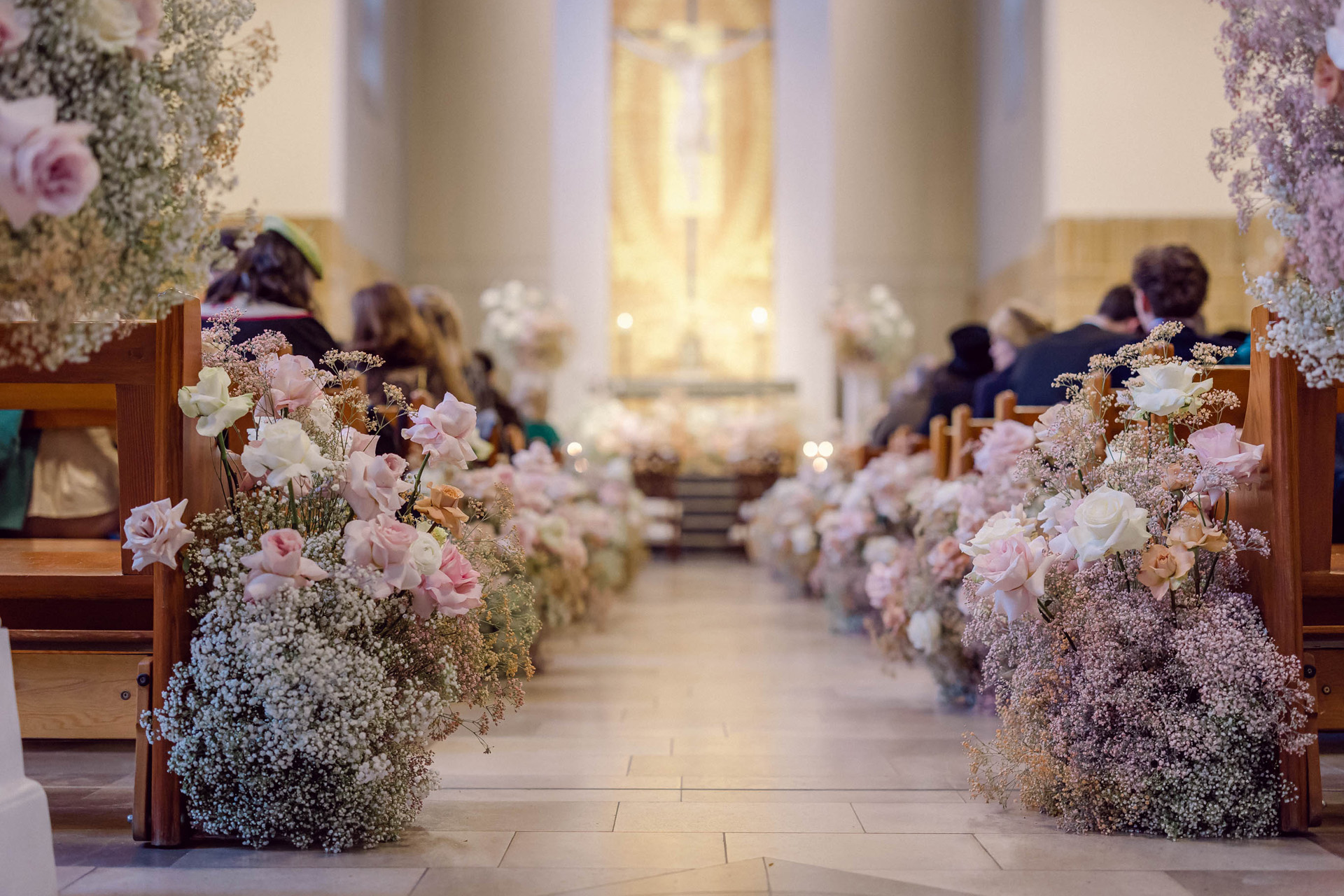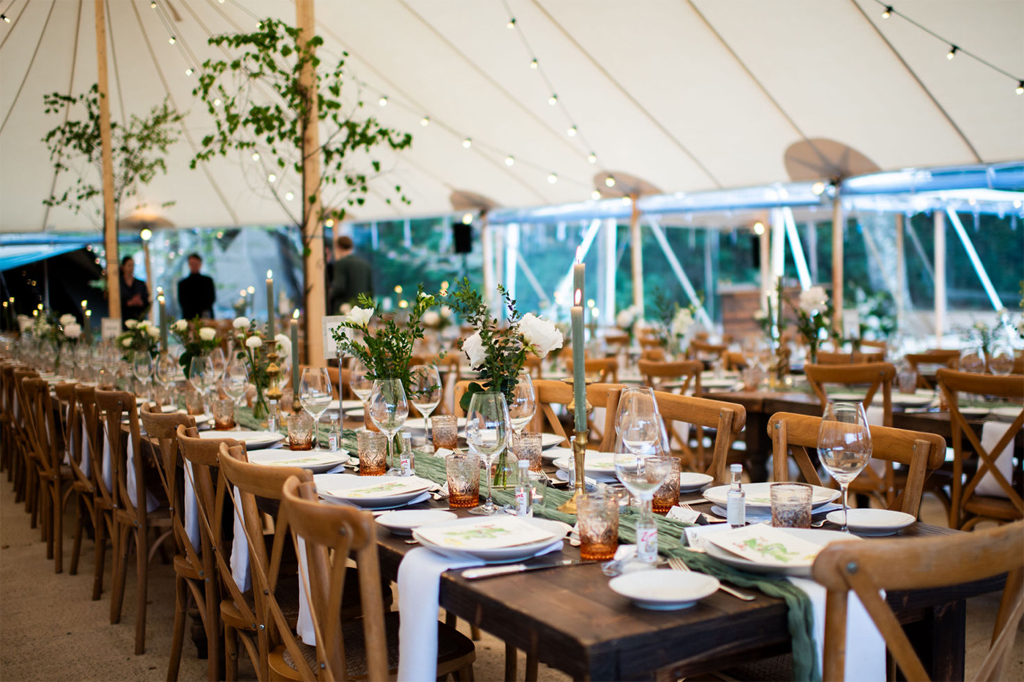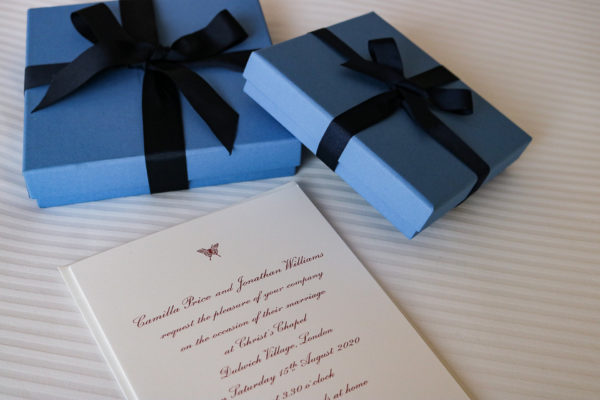
Overwhelmed With Wedding Planning? Here’s How To Cut Through The Noise
By
1 year ago
Six tips from an expert planner
For most people, it’s the biggest day of their life – so it’s only natural to feel overwhelmed when you are wedding planning. We asked Matthew Shaw, founder and creative director of Sauveur for advice on how to cut through the noise.

A wedding arranged by Sauveur. (© Bizzy Arnott)
How To Stop Feeling Overwhelmed When Planning Your Wedding
‘For most couples their wedding will be one of the biggest projects they’ve taken on in their lives to date,’ says Matthew. ‘There is undoubtedly a vast amount of work involved and often lots of outside opinions and input – whether requested or not! I always encourage couples not to fall into the traps of “wedmin”. Wedding planning should not take over your life, and it’s so important to enjoy the planning process. The last thing you want is to arrive at your wedding day tired, overwhelmed and ready to be done with it.’ Here’s how to avoid exactly that.
Enjoy The Engagement
‘To kick things off, make sure you enjoy being engaged!’ Matthew recommends. ‘There is a tendency to jump straight into wedding planning but, trust me, it can wait.
‘When you’re ready to begin, you will want to make sure you have a clear process laid out and understand what’s involved,’ Matthew suggests. ‘There are myriad resources online and it’s important to have a loose vision of the wedding you want to create before you start putting plans in place.’
Ask For Help
‘I would always advise considering if you would like to engage a planner at the beginning of the process,’ Matthew says. ‘They are true experts in their field and will help organise, inspire and de-stress the process for you. If you were spending the equivalent budget on another life event, like a home renovation, you would likely be seeking professional advice and the same goes for wedding planning.
‘As well as supporting with general planning and logistics, a wedding planner will help you develop your ideas, and has the experience to ensure these can be realised,’ Matthew shares. ‘Beyond the catering, design and entertainment, there are also the often forgotten and less sexy elements of planning. Think toilets, rubbish, power… Wedding planners have seen it all before and will ensure this is in place and accounted for from the get go instead of these becoming unwelcome surprises later on in the process.’
Plan The Planning
‘Having a wedding planning timeline is a vital tool in your arsenal,’ Matthew recommends. ‘Before you get stuck in, you should map out your planning process and work out what you do (and don’t!) need to do each month.
‘There is a tendency for people to panic and try to get everything confirmed and ticked off as quickly as possible,’ Matthew says. ‘This is incredibly stressful, and will likely also lead you to questioning your decisions further down the line. It’s a process that you can work through and adjust as you go.
‘You’ll want to get your venue secured early on so you have what you need to invite your guests, and I suggest researching your photographer early on as they get booked up, but then you can take a break and work out your next steps,’ Matthew says. ‘Alongside this, you should also work out who is going to look after different bits of the planning. There is a tendency for wedding planning to be quite one sided, but it should be a joint project!
‘In a similar vein, you should also think about some boundaries and communication about wedding planning so it doesn’t slowly creep in and take over everything,’ Matthew suggests. ‘You will know what suits you both best, but just like your wedding timeline, it is very helpful to know when you do, and don’t, need to discuss your wedding.’

A wedding arranged by Sauveur
Do The Maths
‘Budgets are often everyone’s downfall,’ Matthew says. ‘It’s always wise to get the money discussions out the way at the beginning. If you will be getting support from parents on either side, then work that out early on and also set boundaries about what that might mean for input in the planning.
‘Before you start the planning process and confirming suppliers, you should put together a clear budget of what you are allocating to each area,’ Matthew recommends. ‘It is so important to avoid a scenario where you have confirmed a supplier who is beyond your means and have to unravel this further down the line or make concessions elsewhere. You can then collect your quotes, compare to your budget and adjust as necessary. There will be elements you have forgotten, or were not aware of, so this is a vital exercise.
‘You should always, always, have a contingency in your budget for unknown and surprise costs that appear,’ Matthew adds. ‘They always will. This will help cushion it and keep costs in line. If you are working with a planner, trust their advice! They will know where you can make savings and where you should be spending.
‘My rule is to always allow for great catering and a brilliant photographer,’ Matthew says. ‘Ensuring your guests are well fed and watered is key to the success of any event, and you only have one chance to capture the day and those images will be with you forever, so it is absolutely worth the investment.’
No Comparisons
‘There’s no one way to plan a wedding,’ Matthew emphasises. ‘There are, of course, traditional formats and a wealth of inspiration online and on social media, but your wedding is your day. I’ve seen too many couples try and mould what they want into what everyone else does or be unable to make a budget work because they assume there’s a certain way of doing things.
‘Everyone has an opinion on weddings and planning, and this can often be frustrating and distracting,’ Matthew says. ‘Try to ignore what your friends may be doing for their weddings, what your parents did for theirs, and what all the inspiration images online are telling you. This will help alleviate stress, but also ensure that your wedding is uniquely yours.’

© Wild Weddings, courtesy of Sauveur
Create A Wedding Day Schedule
‘As you start to confirm details, start writing a schedule for the day,’ Matthew suggests. ‘The schedule will become the bible and is where you keep all the information about which suppliers arrive when, who is doing what, and when things need to be done by. This will help ease the worries of having lots of quotes and confirmations flying around and not knowing what to do next. As soon as something is confirmed you should put it on the schedule.
‘A big pitfall of event planning is staff or suppliers not knowing when they need to be ready, so having everything in one place and ensuring everyone has digested this information is key,’ Matthew adds. ‘You should also use your schedule to assign roles on the day. You simply cannot do everything yourself and you need to make sure that you are going to enjoy your wedding day instead of worrying about if the DJ has arrived. If you do not have a wedding planner, then use your schedule to carve up responsibilities across your wedding party, family and friends.
‘Finally, remember to take a moment to enjoy your evening and look out over all your friends and loved ones who are there to celebrate you,’ Matthew says. ‘Weddings go by in a flash, so make sure you soak it all up before it’s just a memory. My goal as a wedding planner is to ensure that our couples can really make the most out of their day and enjoy it. Whether you have a planner or not, make sure your wedding party is supporting you and that you can really take the time to enjoy the occasion.
‘Relax, enjoy it, and don’t fret if things don’t go exactly to plan – it’s all part of the fun,’ Matthew says.
Matthew Shaw is founder & creative director of Sauveur.






















